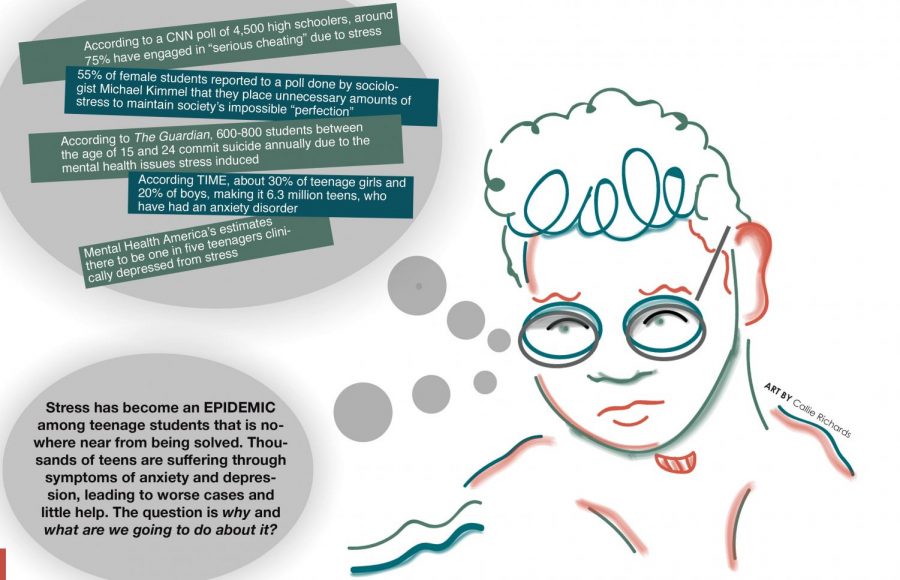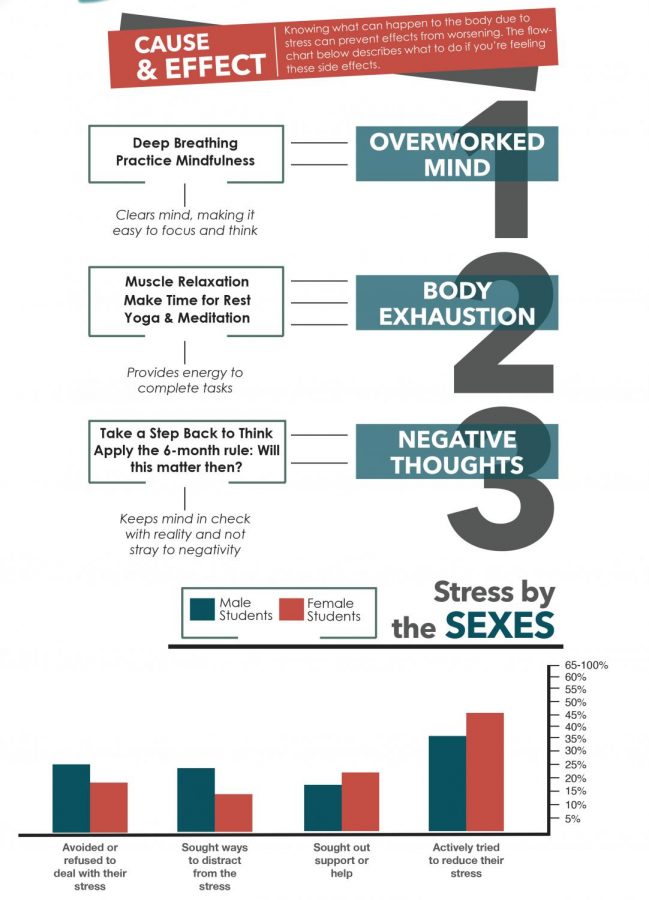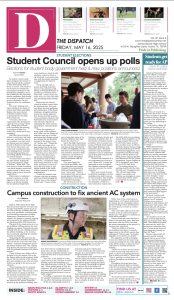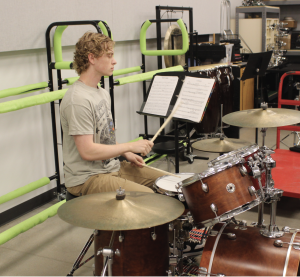Stress: the kids are not alright
November 20, 2017
Stress lingers among high school students like an old friend, growing with time under the nose of its prey. When students don’t know it’s become too much to handle, stress becomes a danger. As conditions worsen in teens, communities are under their own stress in figuring out how to prevent young adults from reaching extreme measures.
According to a study done by the American Psychological Association (APA), 49 percent of students in high school have reported feeling a “great deal of stress” on a daily basis.
“Sometimes people will avoid situations that cause them stress, which for students, can lead to poor attendance at school, falling behind in classes, and ultimately, even more stress,” head counselor Lisa Saunders said.
When it comes to stress, there is such a thing as a healthy amount.
“Life is full of stress,” Vida Clinic therapist Micaela Gonzalez said. “There is such a thing as too much stress but there’s also a thing of just enough.”
According to Gonzalez, controlling stress and managing it in a healthy way is what prevents things from worsening.
“When it comes to the point where you can’t manage it, that’s when you should get help,” Gonzalez said.
The high-level stress epidemic among young adult students is the leading cause of the rise in anxiety and depression rates, due to the physiological change the body goes under.
“When you’re stressed, your body goes into a fight or flight response,” Gonzalez said. “Being at that level prevents you from thinking clearly and that just complicates things.”
Not being able to think clearly makes the individual more prone to anxiety and, especially, depression.
“Depression is one of the big ones because if you feel like you can’t handle stuff, it can affect your self- esteem,” Gonzalez said. “It feels like you aren’t performing at where you’re supposed to be.”
As this chain reaction of stress to anxiety and/or depression goes on without help, health conditions become at risk, too.
According to school nurse Jean Vo-Foradory, chronic anxiety can lead to sleeping disorders, immuno-suppression, stroke, or heart disease while chronic depression can cause substance abuse, suicidal thoughts or actions, or isolation in the long run.
Now more than ever anxiety and depression are prevalent in students, directly correlating with high-level stress environments, like high school.
“I see a lot of students who are really struggling to handle all of their extra curricular activities, responsibilities, and commitments,” Gonzalez said. “Kids who are really over achievers and they really want to give their all to everything in the end may wind up spreading themselves too thin.”
As an officer and senior director in theater, a class officer, president and head of the prom committee, involved with PALS, president of Spanish Honor Society, NHS, and all AP classes, senior Piper Kopser understands what it means to struggle with a stressful environment.
“It’s pretty tough to find free time to do my homework and when I come home from the day, exhausted, the last thing I want to do is whip out a multiple page calculus review,” Kopser said.
Taking a breath when things become too much is one of the main things Kopser does to get a clear view of the situation.
“I have definitely had severe stress and anxiety, and I just have to take a step back and get some perspective,” Kopser said. “I’m 17, in practically the prime of my youth, and I’m stressing over classes that may or may not even help me in the future.”
For junior Cade Blagdan, who is involved in theater, color guard, student council, PALS, and track, he takes a similar approach in dealing with stress.
“Some nights when I stay up too late and have loads of homework, I start to freak out and stress out too much,” Blagdan said. “To handle that, I make myself a cup of tea, or warm milk, power through my homework and I’m fine the next day.”
For freshmen, Blagdan believes the best thing to do is find friends who will support each other through stressful times.
“Find a group of friends that are always willing to help with homework, friends that you can help, too,” Blagdan said. “It makes it all easier to share a load of stress between many than by yourself.”
This aspect of students lives is a big focus of principal Mark Robinson and he is currently working with administrators and teachers on how to help struggling students.
“Introducing some social and emotional learning sessions into FIT is a step,” Robinson said. “I know in the past those have always been academic sessions but it doesn’t really help you deal with the stress aspect.”
For example, FIT sessions are now being offered for freshmen to attend where they can get help with how to deal with overwhelming stress.
“Freshmen are able to sign up for some mentoring sessions with the juniors and seniors, getting some help from people who have been there and done that,” Robinson said. “We’re going to be continuing doing that.”
On top of that, counselors are being encouraged to join FIT sessions about managing anxiety as well as other coping mechanisms.
“We’re talking to the counselors about being able to do some sessions on anxiety, stress management and maybe even yoga, getting teachers who do yoga to get them to do sessions with students so they are able to sign up for that during FIT,” Robinson said.
To prevent stress from escalating, Robinson is working with the NHS by getting students involved with tutoring sessions for ones struggling.
“The first focus is on FIT and getting more student voice in what we need in those sessions and finding out what they need,” Robinson said.
Being able to set a focus on freshmen now will help prevent future cases of extreme stress in the years to come.
“In general, we are trying to have conversations about a growth mindset in letting students know that it’s okay to work on something and get better with it,” Robinson said. “Just because it’s hard now doesn’t mean it will always be hard.”
However, not all help can come from academic situations.
“I think that the school can only do so much to help students with their stress by FIT, off periods, and tutoring,” Kopser said. “The rest of the help has to come from yourself for we are the only things causing ourselves to be stressed.”
According to Kopser, there is only one time students are able to be young adults in high school and being this stressed out during such a vital time is something that must be balanced and taken care of.
“We won’t ever be teenagers again, so I’d say to make sure that you enjoy it,” Kopser said. “Do your best and work your hardest, but don’t get yourself











